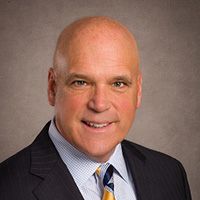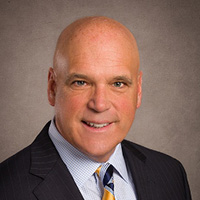Retirement Today Doesn't Come as Easily as It Did in Past Decades
As pensions disappear, retirement savers are left to fill that gap on their own, and that job's getting tougher to do all the time.


Profit and prosper with the best of Kiplinger's advice on investing, taxes, retirement, personal finance and much more. Delivered daily. Enter your email in the box and click Sign Me Up.
You are now subscribed
Your newsletter sign-up was successful
Want to add more newsletters?

Delivered daily
Kiplinger Today
Profit and prosper with the best of Kiplinger's advice on investing, taxes, retirement, personal finance and much more delivered daily. Smart money moves start here.

Sent five days a week
Kiplinger A Step Ahead
Get practical help to make better financial decisions in your everyday life, from spending to savings on top deals.

Delivered daily
Kiplinger Closing Bell
Get today's biggest financial and investing headlines delivered to your inbox every day the U.S. stock market is open.

Sent twice a week
Kiplinger Adviser Intel
Financial pros across the country share best practices and fresh tactics to preserve and grow your wealth.

Delivered weekly
Kiplinger Tax Tips
Trim your federal and state tax bills with practical tax-planning and tax-cutting strategies.

Sent twice a week
Kiplinger Retirement Tips
Your twice-a-week guide to planning and enjoying a financially secure and richly rewarding retirement

Sent bimonthly.
Kiplinger Adviser Angle
Insights for advisers, wealth managers and other financial professionals.

Sent twice a week
Kiplinger Investing Weekly
Your twice-a-week roundup of promising stocks, funds, companies and industries you should consider, ones you should avoid, and why.

Sent weekly for six weeks
Kiplinger Invest for Retirement
Your step-by-step six-part series on how to invest for retirement, from devising a successful strategy to exactly which investments to choose.
America has a retirement problem. Over the past decades, macroeconomic trends and shifts in corporate thinking have made the process of planning for retirement harder to navigate for the average worker. A drift from defined benefit pension plans in favor of employer-sponsored 401(k) plans has impacted the current generation of pre-retirees.
The change has introduced variables to retirement planning that were never part of the equation for the retirees of yesteryear. With a population older than it has been at any point in history, some experts are predicting a "retirement crisis," wherein tens of millions of Americans become simultaneously unable to work and unable to afford to retire.
It has never been more important for workers to understand how the landscape has changed — and how to adjust their planning in order to meet individual retirement goals.
From just $107.88 $24.99 for Kiplinger Personal Finance
Become a smarter, better informed investor. Subscribe from just $107.88 $24.99, plus get up to 4 Special Issues

Sign up for Kiplinger’s Free Newsletters
Profit and prosper with the best of expert advice on investing, taxes, retirement, personal finance and more - straight to your e-mail.
Profit and prosper with the best of expert advice - straight to your e-mail.
Yesterday's pension is today's 401(k)
Pension plans make retirement planning straightforward for two reasons. First, employers are responsible for regular contributions to the plan during an employee's working years. Second, converting that lump sum into a stream of income to meet living expenses during retirement isn't a step for which retirees themselves are responsible.
This system largely automates the process of building a nest egg and drawing it down once they retire. Unfortunately, few companies offer pension programs anymore, opting instead to provide workers individualized 401(k) account access.
Quantifying the extent to which pension plans have vanished from the corporate environment is easier than you might think. Last year, 16% of companies in the Fortune 500 offered pension programs, a drop from 59% that did in 1998.
This generational shift has made today's pre-retirees more responsible for their own retirement planning.
401(k) plans are dependent on the capital markets
Another challenging variable associated with 401(k) plans is their level of exposure to stock and bond markets. Though the risk associated with these securities varies greatly from asset to asset, there's always uncertainty.
Particularly in equities, sharp short-term corrections can wipe out significant amounts of paper wealth in short timespans. An ill-timed market crash devastated many retirement portfolios when investors panicked and sold low.
Retirement savers’ 401(k)s are universally involved in these markets. They depend on them for solid investment returns. A 2017 study found that over two-thirds of all 401(k) plans feature stocks in their portfolios. It's highly unlikely that anyone considering retirement is entirely immune to market downturns, given more 401(k) plan participants hold stocks today than at the height of the pre-recession bull market in 2007.
That makes these new retirement accounts inherently less reliable at any given point in time than more old-fashioned pension plans.
Market volatility in dollar terms has risen
In addition to increased exposure to the stock and bond markets, today's retirement investors are likely to see more turbulence than earlier generations. Two accounts with identical asset allocations, one from 1995 and one from 2018, would have significantly different risk profiles.
The reason is simple: The market itself is larger. The same phenomenon that makes the stock market an excellent long-term play makes it increasingly uncomfortable for investors who crave stability.
As the market has expanded over the past 100 years, a change of 1% in either direction has become increasingly extreme in real terms. A 1% rise worth 8.25 points on the Dow Jones Industrial Average in 1980, for instance, would have represented a 250-point swing earlier this summer.
The amount of dollar value that can be gained or loss in a short amount of time has increased, making volatility feel greater and increasing the psychological difficulty of retirement planning.
Fixed income investments are a way to recapture long-lost stability
All this is not to suggest retirement is impossible for people today — far from it. It is more complex and requires a more thoughtful approach to plan and execute. Fortunately, there are options available to workers looking for the stability of the pension plans of old.
These options include:
- Short term bond strategies: Adding short-term bonds to your portfolio can provide stability and even income to a portfolio, while minimizing risk, based on the limited volatility of bonds of short duration.
- Dividend-producing stock strategies: Choosing stocks with a stable history of dividends is another way of producing stable income. These stocks are generally less volatile than the market as a whole because of the dividend component.
- And annuities: These financial products pay a fixed amount to an individual over time.
Annuities can provide a steady stream of income for a predetermined interval of time, and in some cases for life. They're highly customizable to suit any time horizon and income flow desired. Selecting annuities depends on several factors, including risk tolerance, the timing of payments and tax efficiency. There are a lot of choices out there, including single premium immediate annuities, fixed index annuities and variable annuities. Although they are complex investment choices and should be thoroughly understood before investing, the annuity marketplace is wide open today, offering consumers a lot of options.
It is important to have annuities as part of an overall income plan, to provide safe, stable income, which is guaranteed by the insurance company. These annuities are designed to simulate a pension of yesteryear. This strategy has a similar type of benefit and will reduce the overall risk of a portfolio.
Securities and advisory services are offered through, USA Financial Securities Corp., Member FINRA/SIPC. www.finra.org A Registered Investment Adviser located at 6020 E. Fulton St., Ada, MI 49301. Informed Family Financial Services, Inc. is not affiliated with USA Financial Securities.
Profit and prosper with the best of Kiplinger's advice on investing, taxes, retirement, personal finance and much more. Delivered daily. Enter your email in the box and click Sign Me Up.

Jeffrey E. Bush is the Managing Partner and Chief Operating Officer of Informed Family Financial Services and has been dedicated to providing high-quality service to his clients since 1994. Jeff received his MBA in Finance from St. Joseph's University and graduated magna cum laude from Alvernia University majoring in Business Management. He holds professional licenses, which include Series 6, 7, 63, and 65.
-
 5 Vince Lombardi Quotes Retirees Should Live By
5 Vince Lombardi Quotes Retirees Should Live ByThe iconic football coach's philosophy can help retirees win at the game of life.
-
 The $200,000 Olympic 'Pension' is a Retirement Game-Changer for Team USA
The $200,000 Olympic 'Pension' is a Retirement Game-Changer for Team USAThe donation by financier Ross Stevens is meant to be a "retirement program" for Team USA Olympic and Paralympic athletes.
-
 10 Cheapest Places to Live in Colorado
10 Cheapest Places to Live in ColoradoProperty Tax Looking for a cozy cabin near the slopes? These Colorado counties combine reasonable house prices with the state's lowest property tax bills.
-
 Don't Bury Your Kids in Taxes: How to Position Your Investments to Help Create More Wealth for Them
Don't Bury Your Kids in Taxes: How to Position Your Investments to Help Create More Wealth for ThemTo minimize your heirs' tax burden, focus on aligning your investment account types and assets with your estate plan, and pay attention to the impact of RMDs.
-
 Are You 'Too Old' to Benefit From an Annuity?
Are You 'Too Old' to Benefit From an Annuity?Probably not, even if you're in your 70s or 80s, but it depends on your circumstances and the kind of annuity you're considering.
-
 In Your 50s and Seeing Retirement in the Distance? What You Do Now Can Make a Significant Impact
In Your 50s and Seeing Retirement in the Distance? What You Do Now Can Make a Significant ImpactThis is the perfect time to assess whether your retirement planning is on track and determine what steps you need to take if it's not.
-
 Your Retirement Isn't Set in Stone, But It Can Be a Work of Art
Your Retirement Isn't Set in Stone, But It Can Be a Work of ArtSetting and forgetting your retirement plan will make it hard to cope with life's challenges. Instead, consider redrawing and refining your plan as you go.
-
 The Bear Market Protocol: 3 Strategies to Consider in a Down Market
The Bear Market Protocol: 3 Strategies to Consider in a Down MarketThe Bear Market Protocol: 3 Strategies for a Down Market From buying the dip to strategic Roth conversions, there are several ways to use a bear market to your advantage — once you get over the fear factor.
-
 For the 2% Club, the Guardrails Approach and the 4% Rule Do Not Work: Here's What Works Instead
For the 2% Club, the Guardrails Approach and the 4% Rule Do Not Work: Here's What Works InsteadFor retirees with a pension, traditional withdrawal rules could be too restrictive. You need a tailored income plan that is much more flexible and realistic.
-
 Retiring Next Year? Now Is the Time to Start Designing What Your Retirement Will Look Like
Retiring Next Year? Now Is the Time to Start Designing What Your Retirement Will Look LikeThis is when you should be shifting your focus from growing your portfolio to designing an income and tax strategy that aligns your resources with your purpose.
-
 I'm a Financial Planner: This Layered Approach for Your Retirement Money Can Help Lower Your Stress
I'm a Financial Planner: This Layered Approach for Your Retirement Money Can Help Lower Your StressTo be confident about retirement, consider building a safety net by dividing assets into distinct layers and establishing a regular review process. Here's how.